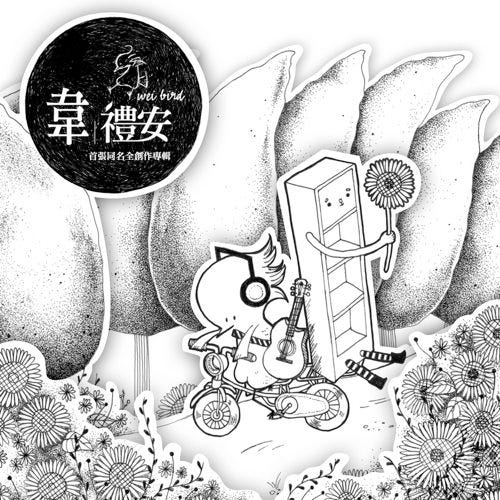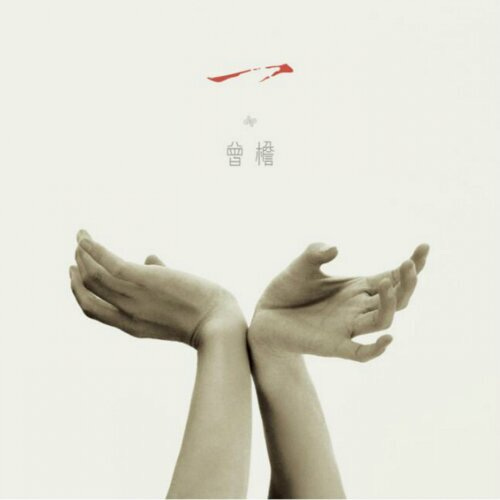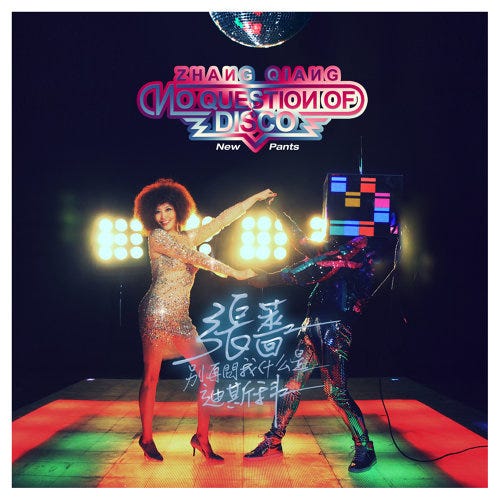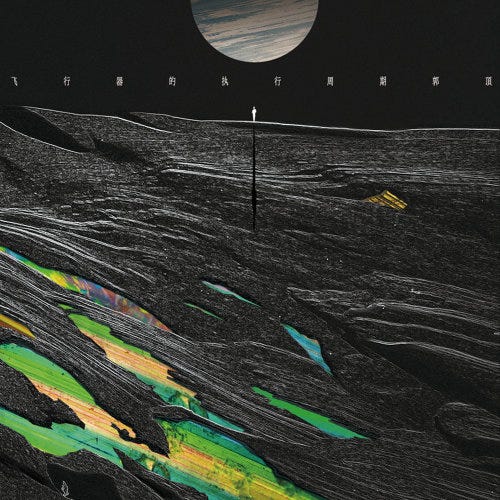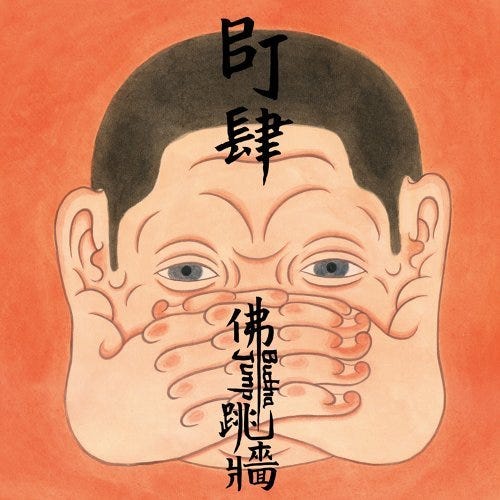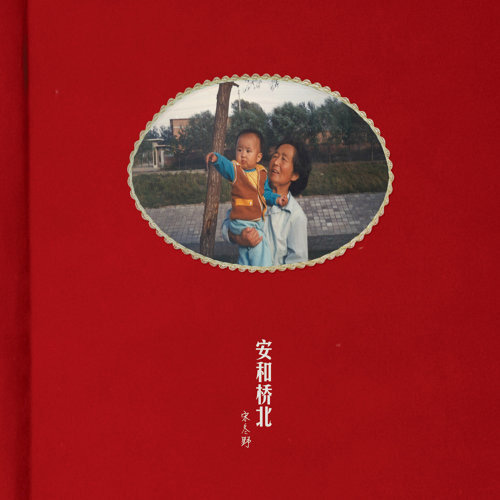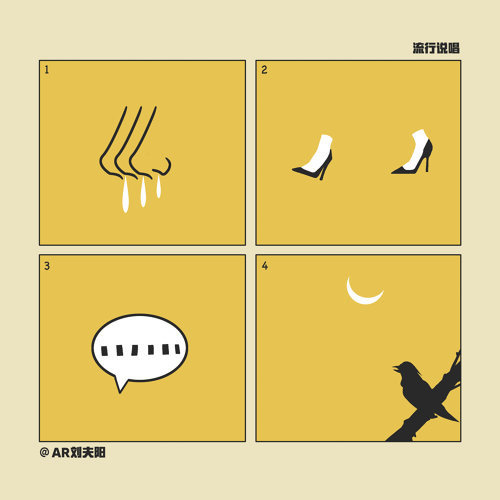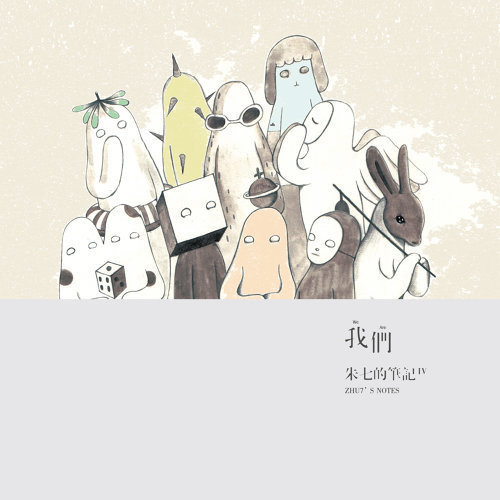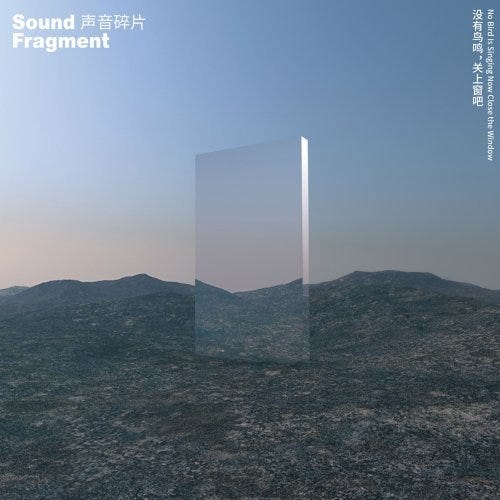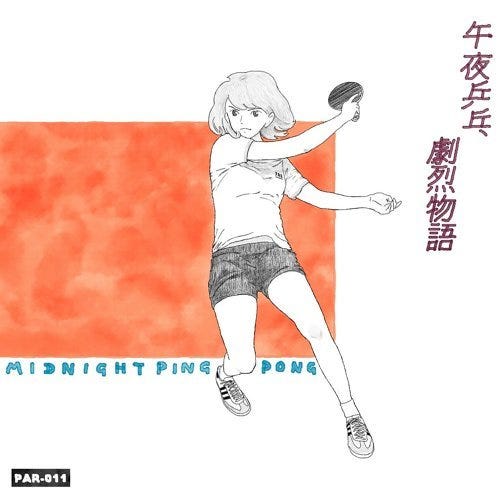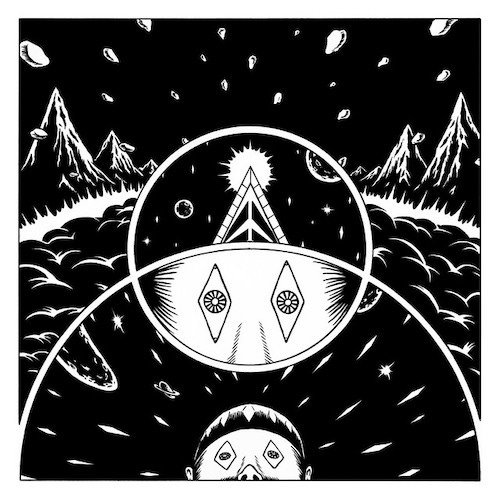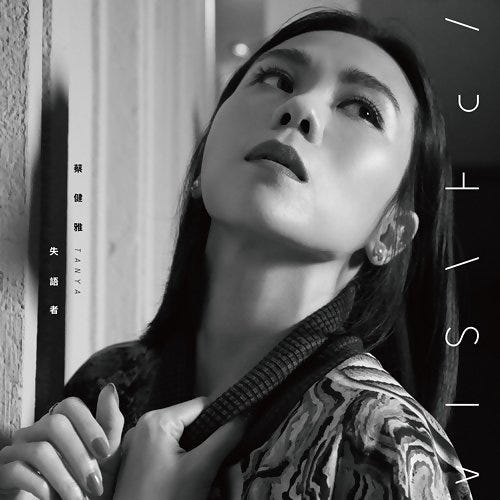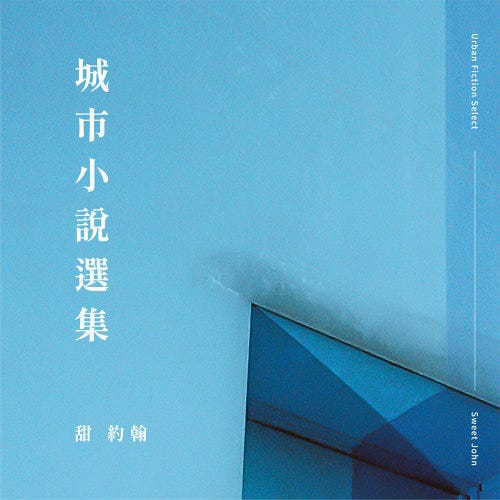The Top 100 Mandopop Albums of the '10s: #50-1
the best albums of the decade, from intimate folk music to smooth R&B, and vibrant dance-pop to rousing guitar rock
50. Tizzy Bac - Him (2018)
Tizzy Bac’s indie rock has largely been characterized by what it lacks. In place of a guitarist, the band’s melodies were mostly controlled by vocalist and pianist Chen Huiting. They’d colour the rest with pizzicato strings, staccato bass notes, hammered drums, and elongated synth melodies. The trio were on sour terms after their fifth album, 易碎物 (Fragile Things), due to conflicting ambitions, but came together to record another album in the wake of bassist Xu Cheyu’s cancer diagnosis. Xu would sadly pass away partway through the recording of Him, leaving a third of the album unfinished and a profound emptiness at the core of their most poignant work. On Him, the bounciness that dotted their work is largely replaced with something mournful, the air hanging heavy as the group sinks into helplessness. The pressure of time running out is immense and the grief is enormously felt, yet Tizzy Bac chug along. “I’d pay everything I have in exchange for the dream of having you again,” Chen sings plaintively on “The River (In the Holiday Season),” ending by affirming, “I love you more than I’ve ever known.” Even in the realization that they can’t fill the emptiness, that they can’t prevent the inevitable, the trio continue performing with startlingly deep affection.
Listen here: Apple Music // Spotify
49. Hedgehog - Phantom Pop Star (2014)
The bright punchiness of hooky guitar melodies and Atom’s high-octane drumming catapulted Hedgehog to the forefront of Chinese rock. Yet prior to Phantom Pop Star, all the turmoil seemed to catch up to them: former bassist BoX would leave the band, while guitarist Z.O and Atom would end their romantic relationship. Youth and passion slipped from their grasp and adulthood turned out to be mundane. The rock band dream was dead. So Phantom Pop Star slips into a new one, experimenting with glassy shimmer and drawn-out chord progressions, but even as their indie rock walks into psychedelic territory, it maintains the same forcefulness. Hedgehog combat the broken-hearted sorrow of reality by precariously taking in a new hazy fantasy.
Listen here: Apple Music // Bandcamp // Spotify // Youtube
48. Chiu Pi - Le Monde (2019)
Le Monde attempts to mutate pain into love. Chiu Pi’s tetralogy of minimalistic art pop often consists of nothing more than a faint electronic beat and an androgynous drone. On “Come,” his voice is a ghostly wisp, repeating the same seven words, “come on, come on, stay with me,” in an enticing loop until it melts into the light synth droplets and sedated ripples of its ambient pop. “Closer, closer, closer,” he seems to beg until it’s all-consuming. Le Monde occasionally grows big, with spoken contemplations over cold club beats and liquid reflections atop traditional strings. It climaxes with Chiu Pi finally availing love as worthy of pursuit over a bright electric guitar before immediately receding into a swan song as he settles into tranquility.
Listen here: Apple Music // Spotify // Youtube
47. WeiBird - Weibird (2010)
After winning a college singing competition in 2007, William Wei turned down the prize label contract, and instead, kept his head down to write while completing school. The result was hundreds of demos on the Taiwanese platform StreetVoice, along with a handful of writing credits for pop singers like Christine Fan and René Liu. But by the turn of the decade, Wei was finally comfortable, launching a self-titled debut album under the name WeiBird. The studio embellishment of WeiBird adorns but doesn’t overpower his campus coffeeshop feeling, leaving youthfulness to be at the heart of Wei’s songwriting. There’s a boyish approachability unpinned by the gentle piano melodies and spirited guitar on his folk-pop and WeiBird is the perfect balm for the college youth, with songs that made escaping a failed relationship and missing home easier when you’re on your own.
Listen here: Apple Music // Spotify // Youtube
46. Xiao Xia - XIAO (2015)
Dignified and decadent, Huang Qishan’s first album under her birth name, Xiao Xia, comes after happily ever after. “I heard true love appears in the gorgeous, selfish, and boundless mind,” she murmurs, before shattering the illusion of a fairytale ending as she rises to a pained howl: “who will expose your lies?” Backed by subtle harmonies and light instrumentation, her sophisticated rasp is at the forefront as she elegantly monologues about the complex nature of love. On XIAO, Huang sheds her previous aggressiveness for more emotionally charged lustre. She’s still confident, later cooing a confession with little room for argument, but packs it with compassionate promise: “with you, I’ll love you, I won’t make you cry, I’ll support you,” she bristles on its jazzy rhythm and sultry electric guitar. Blues and funk influences lend a strut to Xiao Xia’s performance, but these moments of open empathy are remarkably striking.
Listen here: Apple Music // Spotify
45. Zeng Yan - 一 (2011)
In the Huainanzi, an ancient Chinese text that attempts to define the conditions for perfect order, the foundation of all things is one. Zeng Yan attempts to recreate this on 一 (One), anchored in the foundation of the five phases. Glassy, humid atmosphere and a clear piano line introduce water, while her voice is a hurried chatter amidst the sharp destruction of fire. Order gives way to chaos on 一 as gentle trills are recast as ceremonial drums, a restless cloud of violin, pipa, and guqin, and Zeng’s agitated howl. A silhouette of footwork rhythm evolves into new age flute and strings, while destruction stills into an out-of-focus piano melody and the rebirth of a screaming infant—these are just some of 一’s many riveting presentations of transformation.
Listen here: Apple Music // Spotify // Youtube
44. R-chord - Growing Up (2011)
For R-chord, the freedom of adulthood is a burden, with all those dreams turning out to be dull and those plans tiresome. So on the smooth currents and soft-boy raps of Growing Up, he goes back to his youth, acting the child in all the best and worst ways. When R-chord sings of romance, it’s as honest as first love: he’s wholly enamoured in the Latin pop of “Dreaming Girl” and lets Lala Hsu’s voice blow breezes in a moment of instant nostalgia on “Under the Willow.” Yet he’s resistant to change, fearful of the rapid pace of the city and a partner growing apart from him. The soft blend of pop, hip-hop, and rock is reminiscent of Jay Chou up until the end, its acoustic serenade morphing into full-throated metal screams in a call for those who never grow up.
Listen here: Apple Music // Spotify // Youtube
43. Astro Bunny - 在名為未來的波浪裡 (2019)
Léna Cha’s soft, sweet cadence speaks to the lonely, a wispy projection of their collective feelings brought to life in Nu’s cosmic production. The duo could make rejection sound like the end of the world and their efforts to prevent it like travelling to the edge of the universe. Throughout the back half of the ‘10s, they were a dependable comfort as they passively engaged with loneliness on clockwork schedule, releasing one album at the tail of each year. Loneliness is still at the core of 在名為未來的波浪裡 (In a Wave Called the Future)—in the growing distance of a relationship and in Cha’s inability to voice “I miss you”—but there’s something more self-assured to the duo. Cut between futuristic, arpeggiating synths, Astro Bunny begin to resist the pressure to be frozen in cross-sections of the past, pushing forward, even if it means farewell.
Listen here: Apple Music // Spotify // Youtube
42. Zhang Qiang - No Question of Disco (2013)
The Chinese Disco Queen invites herself back to the dancefloor on her first album in eleven years. It comes together gradually on the opener as if she’s imagined it: handclaps, a heavy kick drum, then that life-affirming synth line as Zhang Qiang disregards her surroundings, thrilled to dance under its spotlight and throbbing tempo. Written and produced by Peng Lei and Pang Kuan of New Pants, the pair help her recall the allure of the ‘80s. There are traces of sadness in the realization of faded glamour and lost love that prevents its candied disco from ever properly recapturing the past, but Zhang knowingly plays pretend anyway. Looking back with deep fondness through the static pulse, falling back in love with the dancefloor, she lets herself envision being young once more.
Listen here: Apple Music // Spotify // Youtube
41. Chinese Football - Chinese Football (2015)
Amidst an underdeveloped underground scene in Wuhan, vocalist and guitarist Xu Bo named his band Chinese Football as a joke: his three bandmates weren’t familiar with their namesake—despite the fact that they’d later support them on a revival tour—and Xu didn’t see much in terms of long-term potential for the band. Chinese Football approach their emulation of midwest emo with that playful mindset on their self-titled debut, letting emotions easily come and go across their light-hearted math rock rhythms and circular emo guitar melodies. The band’s solid indie rock is entrenched in a hazy fantasy; there’s no weight to the game of Chinese Football.
Listen here: Apple Music // Bandcamp // Spotify // Youtube
40. AMIT - AMIT 2 (2015)
a-mei has been subversive since her debut: references to Puyuma tradition conflicted with the motifs of popular love songs and her voice was rough, unlike the smooth easiness of other pop stars. But her first album under her Puyuma name, Kulilay Amit, proved to be more incendiary. On AMIT, she took societal issues and blew them into grand spectacles—closer “彩虹” (“Rainbow”) would be adopted by queer activists in Taiwan, a decade before the legalization of same-sex marriage. AMIT 2 reaches even higher, pairing more elaborate narratives with harsher experimentation in nu-metal roars and heavier rock instrumentals. Stunning highlight “Matriarchy” is perhaps AMIT 2’s best statement of her Indigenous feminism and as her jagged and operatic voice matches the intensity of its gothic rock, a-mei’s rage remains uncompromising in her rebuke of sexist oppression.
Listen here: Apple Music // Spotify // Youtube
39. Guo Ding - The Silent Star Stone (2016)
Loosely mapping the distance between two lovers onto the course of a space probe, The Silent Star Stone never loses any of its human poignancy as it drifts through the vast expanse of its science fiction setting. Even as everything obscures, as parts of Guo Ding fragment in the cosmos, it orbits around its romantic core. In the vacant stretch of acoustic folk ballad “About You,” he trails back to a memory, his voice resounding as he wants: “hoping one day, we’ll meet at the usual place.” Hurtling through his prismatic vision that encapsulates everything from robust alt-rock to disco funk, the Chinese singer-songwriter’s space exploration circles back to its origin as the combination of laidback R&B and swing piano transform into smouldering blues rock. Though it’s unclear whether their relationship has held, there’s a promise that he’ll be waiting in Guo’s final proclamations.
Listen here: Apple Music // Spotify // Youtube
38. Buddha Jump - BJ4 (2019)
Within Buddha Jump, Penny Tai adapts her honeyed melodies for explosive pop-rock. As she broods over collective feelings of resentment, anxiety, and fragility, her voice transforms into a torrent of rage over its searing guitar riffs and dynamic percussion. BJ4 only cools as the Malaysian singer-songwriter shifts from interpersonal relationships to inner conflicts—“No One’s Listening” screams down the void, but “Hold On” pauses in the tension, Tai playing coquettish in a lazy reggae rhythm as she eases into rest. The Taiwanese band recorded BJ4 simultaneously, often in one take, and there’s no better demonstration of the tacit understanding within Buddha Jump than the forcefully vibrant improvisation by each member in succession at the tail of the simmering fury of its opener.
Listen here: Apple Music // Spotify // Youtube
37. Song Dongye - 安和桥北 (2013)
“Miss Dong” from Song Dongye, a then-struggling street performer, garnered attention during the folk song revival of the early ‘10s for its simple yet evocative lyrics: “falling in love with a wild horse, but my home lacks grassland” goes one of its most quoted lines. The same weariness of “Miss Dong” pervades the rest of Song’s debut album, 安和桥北 (Anheqiao North), named after a station in the northwestern district of Beijing where he was raised. He commemorates that life here in miniature vignettes—a pigeon he once befriended, a concrete bridge he learned to play guitar under—and uses classical strings to bring gravity to its melancholic youth drama. The rich vibrato of a violin details a character, a cello performs in complementary harmony, and an upright bass brings a chance encounter to life until 安和桥北 cuts off with “Intro,” a reintroduction to the world by way of a subway announcement, background chatter, and life back at a slightly different Anheqiao North Station.
Listen here: Apple Music // Spotify // Youtube
36. Isabelle Huang - Tomorrow Never Ends (2017)
Isabelle Huang’s voice needles between soothing and ghoulish in her pursuit of reconciling two eras of Shanghai. The front half of Tomorrow Never Ends recalls the pentatonic melodies and piercing character of Shanghai opera, but Chang Shilei’s experimental electropop—that grotesque collection of distorted synths that mutate atop one another in squelches and screams or that thumping strut that climbs upward—is distinctly modern. The industrial tremors subside in the second half and Chang’s production cools into something minimalistic. Here, Huang settles into a series of heavenly ballads that breathe an eerie calm, the hints of new age production and mystifying harmonies recapturing that air of tradition. As she floats from the clouds into its golden present, Tomorrow Never Ends is a time-defying waltz.
Listen here: Apple Music // Spotify // Youtube
35. AR - Pop Rap (2019)
Blurring the lines between mainstream and underground rap, Pop Rap and its 2020 companion Non-Pop Rap are split, not by sound, but perspective, divided into examinations of society and the self, respectively. Stacked with references all the way from Japanese painter Hokusai to American rap trio Migos, Guangzhou-based rapper AR’s verses run in a haphazard jumble as he walks through the futility of the modern Chinese hip-hop scene. Bubbly beats and rousing hooks are a thrilling show, but the rapper is his own force of constantly adapting flow. Filling out overstuffed verses and zigzagging rambles, AR makes it look easy as he croons through melodic emo rap and flexes over heavy trap beats.
Listen here: Apple Music // Spotify // Youtube
34. Joanna Wang - Love Is Calling Me (2019)
Joanna Wang’s reputation precedes her: she’s a witty and sardonic indie pop singer, peppering her indie pop albums with outlandish characters in between mandated schmaltzy covers albums by virtue of being a hostage of her label. But Love Is Calling Me sees her approach the covers album with a deep reverence for its works, a clear absence of pretension as she draws from the dramatic romanticism of artists like Teresa Teng, Misora Hibari, and Judy Ongg. Wanting someone unfamiliar with the original versions, Wang enlisted The Decemberists’ Chris Funk for production, the pair pulling from psychedelic pop to give it that ethereal grandiosity. Orchestral elements call to mind something warmly idyllic and as her voice softly is pushed to the background, Wang is captivating as she calls you into the past, drawing you deeper and deeper into its passionate affair.
Listen here: Apple Music // Spotify // Youtube
33. Zhu Qi - 我们 (2012)
The greatest epic of the decade was the title track of Zhu Qi’s fourth album, an ode to the greats and a eulogy to his youth rolled into one. At seven and a half minutes, Zhu ties the course of a generation’s lifetime to the course of Chinese music: ignorant of love as Jacky Cheung release his best-selling Mandarin album, the mobile phone craze as Jolin Tsai and Jay Chou debuted, and the housing crisis at the start of the ‘10s right as Faye Wong would start her comeback tour. Unlike his previous albums which were titled after punctuation marks, Zhu titles his fourth album 我们 (Us)—these are songs meant to connect with both his generation and former sweethearts. To acoustic piano and guitar, the Chinese folk singer keeps track of time in the ways you’ll remember, in days you quit smoking, and in another expansive epic, he counts the years using Bobby Chen albums.
Listen here: Apple Music // Spotify // Youtube
32. We Save Strawberries - Dracula City (2014)
For the dream pop outfit’s third album, Dracula City, they add synthesizer hums and background harmonies to their blend of hefty guitar riffs, broad basslines, and tight drumming. The result is hypnotizing, its glassy atmosphere filled with melodies that know exactly how to ensnare you, capturing you in the loneliest depths of vocalist Labi’s heart. We Save Strawberries anxiously feel the accelerating tick, burrowing deeper into the static as they enclose themselves in the eerie wails of anxious apprehension. But on “Just the Way I Am,” light seeps in, the intensive racket fading to a low churn as a lonesome violin sings through the noise. When Labi murmurs, “thank you for liking me when I am this way,” it’s as if a sunrise has appeared; under the presence of unconditional love, all those questions that felt like an impossible burden seem easy to carry.
Listen here: Apple Music // Spotify
31. HUSH - Monopoly [2015]
HUSH’s close proximity, in both name and sound, to his former band Hush! as he made strides toward the mainstream felt like an early indication of the narrowing distance between Taiwan’s indie and pop landscapes. Painting that indie rock sound with electronic and pop flourishes, cosmic shimmer and transcendent glow bathe the singer to amplify the spiritual mysticism at the core of Monopoly. HUSH continues to maintain the same distance in his solo writing, still leaving it largely detached from personal narratives as he examines life from the perspective of chance and destiny. Yet its boldest and most personal moment resists playing the defeatist. “Just let us be gay, no one can ignore love,” he sings on “同一個答案” (“The Same Answer”), and after having come out publicly earlier that year, the exhale is a heartwarming appeal that sounds worth overstepping fate.
Listen here: Apple Music // Spotify
30. Ty. - Social War (2019)
Everyone points to Sichuanese—the local dialect that lends looser pronunciation than Mandarin— as to why Chinese rap first took off in the cities of Chengdu and Chongqing. Social War does mix Mandarin and Sichuanese with ease, but its opening title track is more telling of Chengdu’s loose atmosphere. Ty. constantly calls for one more round over its clubby beat and there’s a friendly drunkenness that seeps in like a crimson flush. While he’s been known for his impassive delivery, comical one-liners, and auto-tuned hooks, Social War keeps it lively thanks in part to its crowdedness—there’s a wide-ranging guest cast, with prominent features from future Chinese drill pioneer DDG. Casually flirtatious R&B hooks, trap beats, elements of dance-pop, hell, even an Afro-pop track about filial piety courtesy of producer HARIKIRI. Pop the champagne, Social War is an all-out party.
Listen here: Apple Music // Spotify // Youtube
29. Sound Fragment - No Bird Is Singing Now Close the Window (2019)
The title of Sound Fragment’s first album in eleven years comes from Now Close the Windows, a Robert Frost poem about missing out: “no bird is singing now, and if there is, be it my loss.” Now middle-aged, the members of the art rock band know all too well the experience of time escaping. Sound Fragment set the poetry of vocalist Ma Yulong in opposite directions: jazz fusion flourishes are nostalgic, but the pounding drums of “致我的迷茫兄弟” (“To My Lost Brothers”) rattle like a train moving forward. The capsules of Yi ethnic music buried in the acoustic folk instrumentation wistfully call Ma home, yet he faces ahead. “Let the current run, don’t turn back,” he sings, the melody gradually growing into powerful harmony before it floods open, flowing forward.
Listen here: Apple Music // Spotify // Youtube
28. Enno Cheng - Dear Uranus (2019)
Enno Cheng’s second album, Pluto, redefined the self she had previously presented, peeling back to her most vulnerable layer. She had recently come out as lesbian after amicably splitting from Sam Yang, vocalist of the Taiwanese band Fire Ex., so here she was, rediscovering herself in experimentation that moved away from her earlier folk sound to trip hop, electronic instrumentation, and even a math rock stunner courtesy of Taiwanese trio Elephant Gym. She keeps that experimentation alive in the ambient electronics of Dear Uranus, her voice rich and warm as she sifts through weary cycles of difficult relationships and moments of solitude in examination of interpersonal relationships. The light funk of “At a rainy night (would you walk me home?)” is a gentle challenge, while closer “Lightyears of solitude” is a soothing balm for those seeking relief in the stars, empathetically zooming out to view the interrelatedness of its distant bodies.
Listen here: Apple Music // Spotify // Youtube
27. Julia Wu - 1994 依舊舊事 (2018)
Julia Wu was born on the island province of Hainan, China, raised in Australia, educated at Berklee College of Music in Boston, and briefly trained in South Korea under the idol system before landing, slightly lost, in her Taipei. For her second album, the emerging R&B singer might briefly recall her turbulent history but often draws from a more generalized past to dissect her lovesick present. Loaded with retro flair, 1994 依舊舊事 (1994 Still Old Affairs) calls on new jack swing, KTV ballads, and ‘00s R&B in a rewrite of Canadian singer Tamia’s “Officially Missing You” alongside a capsule of references to Star Trek, dial-up romance, gameboys, and more. Her voice is silky and conversational as she navigates modern dating while starting anew in Taipei, effortlessly frank as she spells come-ons and laments seclusion. Wu might have helped shape the future of Taiwan’s burgeoning R&B scene, but the leisure of a track like “小歇” (“Small Break”) calls to mind rollerblading past bubble tea shops filtered through sepia tones; her bright freshness is a reminder that some things are just eternal.
Listen here: Apple Music // Spotify
26. misi Ke - Play (2014)
On Play, you’ll find a sense of what it’s like to truly feel enamoured. “You and this moment both fascinate me,” misi Ke hums in a hushed tone, all shimmer in the wind before fellow Taiwanese singer-songwriter Europa Huang joins in harmony. Ke has this voice that carries wondrous curiosity, sweet and girlish with specks of sadness that make her sense of hopefulness more deeply felt. Play is wild and unbound, but never as much as she wants it to be. She imagines herself as one of those migratory birds, attempting to create as much distance as she can from the piano melody in a moment of liftoff before crashing into an incendiary burn. Ke desires to leave her own body in the gossamer blend of dreamy, atmospheric folk and lush, psychedelic instrumentation but Play roots her in the natural world.
Listen here: Apple Music // Spotify // Youtube
25. Hebe Tien - Day by Day (2016)
Hebe Tien could do things in her solo work that she couldn’t quite do as part of the trio S.H.E, like savour in a romantic utopia for two or enjoy the hedonistic rush of drunkenly stumbling home alone. But it wasn’t until her fourth solo album that she comes to fully welcome the prospect of loneliness. In the fresh air of Day by Day, she appreciates the natural in the brisk opener as it runs like flowing water and inhales the passionate bliss of the electronic shivers on “Beautiful Prophecy.” Warm and plainspoken, Hebe finds peace in self-love: “the person who wants to love, also loves themselves / treat the body well, then the soul will follow,” she delicately sings, receiving herself in a comfortable and heartfelt embrace.
Listen here: Apple Music // Spotify // Youtube
24. No Party for Cao Dong - The Servile (2016)
No Party for Cao Dong know exactly how to cut into a hook to make it ferocious. They transform loose riffs into a volatile flash of disco rock or a more standard wall of sound in heavy howls, tight drumming, and thick layers of guitar. They surrender to these poles: the calmness of servitude and the ugly, boiling rage of an approaching revolution. Danceability is often the Taiwanese post-rock band’s only sense of security, a trait that keeps The Servile moving as they sing in stacked harmony of powerlessness and only occasionally do they vent their frustrations back at society, redirecting taunts and sneers at their tormenters. Indentured until no longer useful, as vocalist Wood Lin grows from a quiet whimper to a ferocious roar in the closing folds, screaming “kill the nightmares, and kill me, too” feels like a reclamation of the only agency No Party for Cao Dong have left.
Listen here: Apple Music // Bandcamp // Spotify // Youtube
23. Hello Nico - Familiar Desolation (2015)
Treading water in the murky grey waters of Familiar Desolation, Chan Yuting finds herself disoriented, pausing each time she makes a move to escape, unable to create a path through its gloomy electronic ambience. The band’s dream pop weighs heavy in the darkness, layers of synths blanketing over distorted guitar and piano melodies. “Until the moment I started hating myself, only then did I know how to face myself honestly,” Chan sings on “Now and Then,” a moment of brightness after sinking to the bottom. Her vocals double as she makes the realization in her favour, “I can’t love you, how can I say I’m in love with you.” It echoes to the end, buoyed by a gentle yet firm shoegaze guitar that prevents her from going back on that promise. Blooming open, the expansive electric guitar starts to glimmer, tracing an exit through Hello Nico’s shadowy indie rock.
Listen here: Apple Music // Spotify // Youtube
22. Lala Hsu - Limit (2010)
Sometimes Lala Hsu can shrink into someone diminutively delicate—she becomes lowly when admitting her fears, confessing to a friend that they’re the only one who gives her courage. But other times, like on the tremendous title track of her second album, Limit, she rejects that fragility, sounding instead like she could burst through its container. “My limit ends here, even if I can never completely recover,” she howls during a particularly painful moment of a split before immediately and forcefully flipping it: “your limit also ends here, don’t cross my disarrayed heart.” Co-written with David Ke—the most prolific lyricist of Taiwan throughout the ‘10s—its catharsis explosively upends the singer-songwriter guitar instrumental. Limit tends to go subtler, stretching her voice to its kindest as she embraces a friend and its most provocative as she cruises in the passenger seat of a mysterious stranger’s car. As Hsu alternates between heartbreak and flutter over the pared-back arrangements, Limit proves to be no less sympathetic or stirring in its smaller revelations.
Listen here: Apple Music // Spotify
21. Yoga Lin - Fiction (2012)
Fiction is an anthology that smartly pairs genres of storytelling and music together to bring out each narrative’s theme. Retro new wave and melodramatic early sci-fi bring out the whimsy of an alien invasion; campy horror is gleefully arranged with a bluegrass guitar and a banjo strum. These stories are vivid: “Runaway Mama” paints the picture of a woman escaping a loveless marriage to dance, complemented with a bombastic vocal performance from Yoga Lin as its pop rock instrumental throws caution to the wind. As Fiction takes on unrequited love, Lin’s colourful details fade to bare sketches as he plays the relatable fool of a protagonist. There’s something raw as its closer edges towards something biographical in its bedroom pop, something honest in its despair, something the rest of the climaxes across Fiction’s short stories attempted to conceal.
Listen here: Apple Music // Spotify // Youtube
20. Eve Ai - Fade to Exist (2018)
More than just another assertion of her bluesy voice, Eve Ai assumed creative control for the first time on Fade to Exist, a resolute confrontation of grief and loss. The unconventional arrangements are instantly magnetic, amplifying the emotional turbulence at the core of her lyrics and compositions. Ballad “To Julien” uses simplicity to carry the drama of its quivering melody, but the tense atmosphere of “Annihilation” is what truly delivers the intense suffocation of “all too much”—the layers of vocal production make each gasp of air meaningful, while the grand crescendo lets total decimation taste sweet on her tongue. Likewise, the blues rock of “Guilty, Wright Brothers” makes distance sound like inflicted pain, each drum beat another lashing, each howl another round of hellish fury. Swallowed by grief, Ai torturously suffers by lingering throughout Fade to Exist, the feeling of separation an impossible burden only lightened by the reminder of what it means to love.
Listen here: Apple Music // Spotify // Youtube
19. Wild Cooperative - Dangerous Journey (2019)
Dangerous Journey is a live recording of a performance by Wild Cooperative for a Shanghai audience of their studio debut album (which unfortunately never received a global streaming release). The Nanjing band expands upon Bull’s Eye, rearranging the tracklist, splicing older tracks, and pausing for passages of vocalist and guitarist Wang Haiyang’s poetry. Wild Cooperative’s psych rock has often drawn comparisons to Pink Floyd, but as they subject themselves to the storm, they’re wearier travellers. Calm in the eye, raging outside—it’s a force amplified by the setting, the live rawness staging its imminent danger better than any studio lustre can. Wild Cooperative’s folk rock feels looser as wind whistles through it, while their blues rock stings sharper thanks to the tempestuous storm. It’s impossible to resist the pressure of the typhoon; Wang never tried on Bull’s Eye and accepts it equally as calmly here. He patiently navigates through distorted guitar and raging drums, a sense of victory in delighted cheers, applause, and laughter from surviving alongside the wreckage.
Listen here: Apple Music // Spotify // Youtube
18. Deserts Chang - Games We Play (2012)
Any semblance of control slips through Deserts Chang’s fingers on the opener “Rose-Colored” as the ominous piano line overtakes her stately guitar strum. A track later, it’s the reverse, her guitar forbidding on the clamorous folk rock of “Lunatic’s Sunbath,” while the piano acts as a pleasant adornment. Chang—on her final album before reverting to her birth name anpu—understands herself as a helpless pawn in a game of fate. She recolours the brightness with grim brooding, letting all landmarks eventually fade into tiny specks across her expansive indie rock arrangements. Dusty earth painted with piano melodies, stars traced with delicate guitar work. Recognizing she can’t win in the world, “You Were Here With Me” allows hope by building anew, letting everything but you and her fade in the intimate dream pop ballad. Like fate itself, Games We Play is an enigmatic odyssey, kind in moments of calm, cruel in moments of vulnerability.
Listen here: Apple Music // Spotify // Youtube
17. Midnight Ping Pong - Intense Story (2016)
Midnight Ping Pong’s twin guitarists work as the rational and emotional parts of the brain, engaged in a constant contest for the advantage. One chugs along at a steadily trained pace, while the other sets themselves ablaze, launching into fervent emo riffs and zig-zagging rhythms. Their grandest battle comes on “The Cinema of Paris,” which fluctuates between coached pace and rebellious deftness before ultimately coming to an evenly-matched volley of alternately-led guitar harmonies. Rarely does rationality win out on Intense Story, the Taiwanese band’s unruly indie rock charged to a greater ferocity by heated drums, sparky basslines, and Liu Bangjie’s punky vocals. “If you sneeze in winter, maybe I suddenly thought of you,” he shouts with little care, somehow casually affectionate. Midnight Ping Pong resolve to give everything for these stakes, a bright blaze of a grand inferno as they throw aside any remaining sense of caution on their final set.
Listen here: Apple Music // Bandcamp // Spotify // Youtube
16. J-Fever - 一定是爆炸么? (2014)
Rapper J-Fever came up on Beijing’s underground freestyle scene, which is perhaps why 一定是爆炸么? (Does It Have to Be an Explosion?) sounds so easily spontaneous. A pioneer of Chinese abstract hip-hop, he enlists Chinese-American producer SoulSpeak, who leans more psychedelic than J-Fever’s usual jazz backdrops. It’s a wacky space adventure, the rapper referencing events like a party in the cosmos or a marriage to a robotic voice on Mercury as he drifts through a collection of funk-infused beats and electronic bleeps. Yield in comical disbelief to J-Fever’s immaturity: there’s a ‘90s hip-hop track here devoted to a woman who may or may not have farted on him. But zooming in and out, he’s content to let things go as he blows the specifics into widescreen just to miss the details that matter. J-Fever relinquishes all those torturous thoughts to arrive at tranquil ease, letting that recurring motif of an egg, rather than fester, transform into a good breakfast.
Listen here: Apple Music // Spotify // Youtube
15. GONG - Coming Soon (2019)
On his third album, the Chinese producer’s disorienting, circular loops that formed a mental cage morph into more complex, boundless, labyrinthine productions. The gentle pitter-patter of hi-hats opens like the clicking of a film reel, a space where GONG rewrites endings over and over again. “夕阳·日落” (“Sunset·Sunset”) is perhaps the best example of his perfectionism in action: GONG sings about a bloody sunset to digital strings then demands a redo, swapping its sharpness for languor with glacial keys and soft drums; at the same time, he recontextualizes its sunset as a different set of characters and sings of finality with wistful longing. He alternates between scenes of danger and tenderness. Gentle, starry atmosphere grows into a forgiving embrace upon understanding the impossibility of a promise to carve out time, a distorted guitar morphs into something swampy as it realizes there’s no one coming, and cold drums nervously break into a drum’n’bass breakdown even though the distance never closes. GONG’s dystopian electronics sculpt scenery in constant change, so vivid that being just out of reach can feel excruciatingly painful.
Listen here: Apple Music // Spotify // Youtube
14. Shi Shi - Shi’s Journey (2018)
Shi Shi released two albums in 2018: Woman, the tidy conclusion to her trilogy of contemporary R&B albums that started in 2014 with Girls, and Shi’s Journey, made simultaneously as a looser, more liberating experiment. It’s something of an abstract travelogue for the South Korean-born singer, conveying the confusion and novelty that comes from settling into a new home in Taiwan in the flurry of piano keys, sultry guitar melodies, and punchy riffs. She plays it less straightforward, with experiments in disco funk, Motown blues, and big band arrangements that line its comfortable jazz fusion, all while delivering performances that are soulful and psychedelic. Shi Shi’s voice is in constant metamorphosis on Shi’s Journey, from breathy, lovelorn coos to discontented, anguished screams. She rebukes a lover in the destructive frenzy yet plays it coolly assured during a flirtatious game of chicken with ØZI. Shi’s Journey isn’t aiming to uncover something from its scattered souvenirs but simply desires to release all that pent-up energy. “Sing, sing, sing my baby!” she calls on “Never Lose Your Smile.” Delivered over that glistening guitar tone, it’s the pure sound of pleasure.
Listen here: Apple Music // Spotify // Youtube
13. Sandee Chan - I Love You, John (2011)
The titular “John” refers to this popular Taiwanese internet slang of the time, a homonym for the Mandarin word “this way,” and so when the alt-rock pioneer Sandee Chan sings, “today’s girls all like John, he’s very stylish,” her repeated adoration of the chorus sounds like an attempt to be, well, one of the teenage girls. To be younger and to be filled with adolescent affection. I Love You, John—as well as her collaborative project with producer George Chen, 19—abandons the darkness Chan carried in the previous decade, instead brimming to life with the bright quirkiness of Shibuya-kei. It’s a cotton candy daydream brought to life by charmingly sweet melodies and the lively ebullience of her almost toy-like electronic instruments. Chan disguises its heaviness in shadows, concealing domestic violence in a sugary romcom soundtrack and burying naïveté, which she frames as a disease in need of treatment, in a commercial jingle. I Love You, John slides down easily; later in the decade, Chan would bring that sharpness to the forefront, expounding political, sci-fi, and internet-related themes over more atmospheric electronics, but here, cosplaying as the young girl feigning ignorance, I Love You, John falls in love under an urban fantasy.
Listen here: Apple Music // Spotify
12. Cosmic Child - Blue (2018)
“The harsh noise and wispy voices of shoegaze music is the language we use to communicate sentimental things,” RUBUR frontman Maojia explained of the genre’s popularity across Asia. There’s a rich smattering of shoegaze bands scattered across the Sinosphere—Hong Kong’s Lucid Express; Taiwan’s U.TA; and China’s Default, whose English-language California Nebula was the best Chinese shoegaze album of the ‘10s—but the shoegaze album of the decade was Cosmic Child’s Blue, recorded in a mix of English and Mandarin. Like the best of Singapore’s indie scene, there are pop aspirations here, streaks of sunlight cutting through the misery in ringing, iridescent guitar tones and shimmering melodies. Although their wall of distorted guitar embodies melancholic bleakness, it’s also a source of warmth as it swells in grand crescendos that chase away the emptiness. Frontman Zhang Bo sings about how the hallucinations left in the aftermath of a relationship make him want to kill himself on “Cats, Cats, and Cats Again” but elsewhere, Cosmic Child punctuate the word “try” repeated over and over with the bright swirl of noise. It chimes, as if in reminder that even struggling can feel life-affirming. “September Coffee” runs anew, closing Blue like a crisp breeze and despondency recasts itself, the weight of nothingness no longer exhausting to carry. This was shoegaze as Maojia called it, every hushed sentiment exploded into a dissonant ring and packed with conflicting emotions.
Listen here: Apple Music // Bandcamp // Spotify // Youtube
11. Iruka Porisu - Call Me When Night Go Blue (2019)
Iruka Porisu—that’s Japanese for Dolphin Police—make the kind of animated motions of Sunday morning cartoons, a little bit stupid yet charmingly likable. The band’s two vocalists, Marko Woo and DSPS guitarist Hsu Tzu-Chuan, are a pair of lovable goofballs who aggrandize their lines to comical effect. “Weirdo I Love U” opens like an extended sitcom tagline, the pair alternating spoken lines before coming together in an exaggerated union: “are you ready to set foot onto this road called ‘dream’ with us?” The rest of the song is melodically lazy, but their harmonies are fresh and their oddball tendencies bring it to life as they stretch in moans and screams. Call Me When Night Go Blue is a delight of episodic adventures in romance drama and the everyday, like a girl whose luck has her constantly and laughably stepping in dog shit. Its bright, cartoonish indie pop is an equally whimsical package, painting arrangements in vivid colour. Shimmering twinkle provides a little retro glamour and a funky bass line threads through buoyant guitar melodies and thumping drums to make the pair’s vocal tics sound playful rather than phoned in. It’s immersive—as the tone of a convenience store bell chimes, Iruka Porisu absorb you into another animated adventure.
Listen here: Apple Music // Spotify // Youtube
10. Omnipotent Youth Society - Omnipotent Youth Society (2010)
Omnipotent Youth Society, China’s most beloved band, loves taking the scenic route. Formed in the northern city of Shijiazhuang—known for formerly being a manufacturing hub in the ‘60s—the band started performing locally in the late ‘90s but wouldn’t release their self-titled debut album until 2010. Instrumental opener “The Hall of Dog’s Urine” is perhaps what you’d expect of such a band: a flurry of stinging electric guitar riffs and brash drums in short but unyielding clamour that captures the unsavoury appeal of rebellion. But the rest of Omnipotent Youth Society proves that they’re more interested, and better, at taking the longer path, at sprawling over ambitious, winding arrangements. Building on the simple yet enthralling melodies of vocalist and guitarist Dong Yaqian, they combine elements of prog, blues, and freeform jazz with their folk-rock in an attempt to tame the wildness.
Dong’s rambling can feel healing through the noise as bassist Ji Geng approaches lyricism with an empathetic view: when he writes of Dong’s depression in his absence on “Qinhuangdao,” it’s viscerally felt, while a smoke-veiled dream of a father pleading with his son to reconcile with the past is emotionally stirring. Across Omnipotent Youth Society, Shi Li’s trumpet helps evoke a warmness, but the band transform with seething violence as they draw attention to tragedy. Not even cool brass or strings can cut through the pressure of the finale. “Living like this for thirty years until the building collapses / ten thousand runaway horses, running in his head,” Dong calls on “Kill That Man from Shijiazhuang.” Often interpreted as related to the Shijiazhuang bombings, Ji’s more bluntly explained it as about an indifferent father, a desperate mother, and an untamed son. Perhaps it’s in effort to avoid censorship, but regardless, Omnipotent Youth Society’s depiction of a family so common makes its feverish imagery all the more horrifying.
Listen here: Apple Music // Spotify // Youtube
9. Tanya Chua - Aphasia (2015)
Abandoning gentle, acoustic instrumentation for layered, electronic mosaics, Aphasia pivots from the Singaporean singer-songwriter’s norm into gothic noir aesthetics. Tanya Chua’s been known to be a tender romantic—the bright, optimism of 2011’s Sing It Out of Love is easily another highlight of her career—but the closest she reaches to a love song on Aphasia is the tragic stalemate of its title track. “In love, we still won’t repent in death,” she sings, throwing the distinctive weight behind the beautiful curve of its melody, “we choose to suffer.” There’s an imposing decorum even in her own tragic hypocrisy, even as she finds herself unable to grasp the proper words to prevent its inevitable ending.
Aphasia’s brightest songs are lined with that same forbidding character: the lustre of devotion escapes her as the playful danceability of “Enigma” is submerged, while “Cat and Mouse” offers no prizes in the threatening commotion. Her feelings of alienation are swallowed in the steely textures of atmospheric electropop and disconcerting goth rock. She knows of love as something that must end even as coldness thrives, but regardless of it, Aphasia still manages to draw out some of Chua’s romanticism. Despite knowing both have let go, she sings of the best moments of a relationship. Despite understanding she’ll meet death, she sings about living life fully. And despite the icy surface, there’s an abundance of gleaming subtleties dancing in the murky depths of Aphasia—like the shimmer of a synth waiting to be caught—and Tanya Chua holds an idealist heart trapped within the gloomy cynicism.
Listen here: Apple Music // Spotify // Youtube
8. ADuo - Reborn (2017)
In 2012, ADuo announced her early retirement after growing bored with her own music and anxious of the stage. In the period following, she spent years living across villages in Huanan, Yunnan, and Guizhou, working the farmlands with people who shared her Tujia and Miao (also known as Hmong) ethnicity. Singing in the fields with these peoples, ADuo became inspired once again, returning with the ambitious Reborn five years later, a soundtrack for a theatrical performance of the same name in a showcase of her cultures, with Miao beliefs of death and resurrection serving as part of its foundation. Reborn follows the tale of a young girl named Qiao as she searches for a love her father once described to her. But ADuo’s lyricism often strays, enchanted by natural blessings and divine imagery. At the lowest point in Qiao’s chronicle, ADuo sings: “standing on the clouds, watching the rain fall / my life has split open so that the sunlight might shine through.”
Reborn is an inventive blend of ethnic folk music, mostly of the Miao people, with modern electronics: a suona, a piercing Chinese woodwind instrument, cuts through a techno daydream, while synths elevate a repeated chorus built on Miao vocalizations. ADuo uses daily appliances found across the villages to create percussion, the clang of utensils across earthy vessels forming a distinctive sounding instrument. In the fable of Reborn, Qiao endures deep pain to journey full circle and find that love she was told of waiting for her at the place she originated from. It’s not unlike ADuo, who was reinvigorated upon returning home, but the real potency of Reborn lies in how carefully she brings its riches together as she fuses modern pop pyrotechnics with her cultural traditions.
Listen here: Apple Music // Spotify // Youtube
7. Wanfang - Let’s Not Grieve Anymore [2010]
Maybe a better translation of the title—at least in the context of the title track—is “we don’t have to grieve anymore. It’s a subtle but powerful distinction and when Wanfang sings about the knot in each of your hearts, arriving at the titular phrase feels like loosening the guilt that once tied you together. She offers a choice rather than forcing you to feel some emotion. The Taiwanese singer-songwriter’s first album in eight years works through imposingly grand emotions built around cavernous arrangments. The enormous echo of drums, guitars that run smoothly like flowing water, and strings plucked like misty droplets.
On Let’s Not Grieve Anymore, Wanfang sings of sorrow in billowing drafts and anxiety to pointed piano keys, yet she doesn’t hesitate to embrace their inverse emotions. She welcomes joy and passion superimposed onto a power pop guitar that prances even before drums and friends arrive. On the dismal, gloomy ballad “Don’t Wanna Be,” she rejects the existing state without straying from polished blankness, Wanfang herself is unperturbed even as it upends itself with a liberating breakbeat midsection. Let’s Not Grieve Anymore releases itself from the most painful binds in quiet so that by the closer, she can open outward with melancholic Spanish guitars. “I am me, you are you, can we love together?” Wanfang ponders, and although the sorrow has washed away, she still leaves the question of a renewed relationship as a gracious choice, a hand outstretched to someone who has suffered just as equally.
Listen here: Apple Music // Spotify // Youtube
6. Sweet John - Urban Fiction Select (2019)
As Taiwanese indie and mainstream landscapes moved closer and closer, the tail of the decade saw plenty of indie acts who would debut to positive reception then refine their sound, going on to make leaps and strides as they scaled to more pop-oriented production. Sweet John were ahead of the curve: the five-piece’s debut, Dear, blended indie pop and nervous alt-rock, but their second album does away with some of its plinkiness for a more rounded and immersive atmosphere. Urban Fiction Select intensifies the brightness, with candied electric guitar riffs, dazzling keyboard melodies, and chimes that transform into delicate embellishments across their cityscape. At the same time, the band deepens their understanding of rock influences, with elements of post-rock and math pop rhythms added to their curious melodies.
Their honeyed indie pop vividly colours over scribbled short stories of urban life and unfinished character sketches. On “Window Seat,” Mandark and Genwie Wu trade verses before joining in aromatic harmony, yet all that awaits their anxiety-ridden stargazer is a no-show missed connection. Sweet John don’t dwell on these moments, the scene fading out in heartbeats and city tones as they shift into a swirl of intricate melodies and jagged rhythms for the next portrait. Urban Fiction Select recognizes that the city doesn’t bend to you—grief-stricken “See, You” has to move to escape, conforming to expansive post-rock. When they return to the city movements, it’s with renewed passion: “there’s something in my heart, rolling undercurrents, non-stop action,” Mandark and Wu sing on “Neon Stream.” Sweet John are relentless daydreamers, peering into the hidden pockets of the city’s corners, holding out with bated breath for a flash of excitement.
Listen here: Apple Music // Bandcamp // Spotify // Youtube
5. Sandy Lam - Gaia (2012)
By the end of the decade, Sandy Lam would quietly bow out of the entertainment industry as she disappeared behind 0 in 2018. 0 is an album of self-contained inward reflections. It’s an investigation of the circular nature of everything, built on swirling ambient pop, new age, and downtempo that’s inventive in subtle strokes, ending the Hong Kong singer’s career on a peaceful high note, one enshrouded in heavenly mysticism. But Gaia’s the album that’s (deservedly) hailed as Lam’s late-career pinnacle, the landmark album that combined her commercial-minded sensibilities with thrilling experiments in new age instrumentation, choral chamber pop, and glitch pop mashed into pop rock. Gaia is a more aggressive stance on change, with little sense of renewal in the destruction.
Past a mix of prayers in Latin, Hindi, and Greek on opener “無言歌” (“Wordless Song”), Lam stumbles through a blend of balmy new age and glitchy static into its chorus, helplessly pulled along by the dance beat. “Save our mental state / save the sins of our mind,” she implores in prayer. Later on the title track, she’s the other side, Earth personified into violent rage: “unforgivable, the faith I had is being waste drop by drop,” she seethes as the world crumbles to dust in thrashes of guitar and heavy drums. It’s impermanent, time easily demolishing the world’s features, crumbling them like illusions. Despite knowing she can’t reverse course, Lam chooses to love whole-heartedly as she assumes the form of a pedestrian. “For you, I could be without anything,” she softly hums on the deceptive calm of “也許” (“Maybe”). There’s a Cantonese version of it and “紅眼眶” (“Red Eyes”) stitched to the end of Gaia, hidden behind “Stay,” a gentle realization of something beautiful within the destruction, and against all logic, an attempt to make love permanent within the constant of change.
Listen here: Apple Music // Spotify // Youtube
4. Sodagreen - Autumn: Stories (2013)
In 2009, Sodagreen launched their ambitious Vivaldi Project where they attempted to craft four albums that musically expressed each season. They built them around genre and location of recording: bright folk songs recorded in Taichung for Spring‧Daylight and celebratory Brit-pop, recorded in London for Summer/Fever. Winter Endless would arrive in 2015, recorded alongside the GermanPops Orchestra, grand in its frigidness, but Autumn: Stories is their most affecting album. Recorded in Beijing, Autumn: Stories understands the contradictory nature of the city, like how travelling from one end to another can feel like walking into the past, how its streets can look like a mishmash of eastern and western iconography, and how people arrive seeking hope just to find disappointment. It drifts in this space, layering something old-fashioned over their pop rock in playful baroque guitars and a pensive ensemble of woodwinds and traditional strings.
Autumn: Stories is a history of a relationship. Magnify the harmony between frontman Wu Qingfeng and guest vocalist Priscilla Ahn on “從一片落葉開始” (“From a Falling Leaf”) and you’ll capture two kids in love, gleefully racing above the band’s giddy pop rock through the old districts of Beijing. But the bountiful harvest of autumn also marks a descent into the coldest parts of the year, and later, Wu grasps at the fading relationship over the icy piano line of “我好想你” (“I Miss You So Much”). In isolation, these are souvenirs of someone once cherished that beg to return to that moment. But etched across is a clever inscription that underscores the nature of each season. Each track begins with the final word of the previous, forming a bleak couplet: “I spread out my worries / you only saw the present autumn.” It’s a reminder of the pain you sometimes skip over when revisiting memories, the observation you need to prevent yourself from falsely believing you can change the past. Autumn ends as all seasons do and those undisturbed memories drift in a grand swirl of leaves, a relationship forever inscribed into Beijing’s cool autumn as drafts of longing hang in the chilly air.
Listen here: Apple Music // Spotify // Youtube
3. Cheng Bi - I Want to Waste Time With You (2015)
After completing a degree in Japanese culture at Peking University, Chinese singer-songwriter Cheng Bi began to divide her time between Beijing and Tokyo. It was in Beijing where she’d first learn to play guitar, but working abroad in Tokyo, Cheng would meet prominent poets like Shuntaro Tanikawa and Tian Yuen, as well as musicians like Shione Yukawa and Ichiko Aoba, who would all become heavy influences in her work. Cheng felt the two mediums were analogous: the simplicity of folk music felt akin to the shortness of poetry and the pair’s surface-level modesty deceptively housed an incredible wealth of depth. That connection became the basis of her second album, Poetry Meets Song, as she adapted the words of Japanese and Chinese poets to tranquil folk compositions. It’s a gesture that would become habitual across her career, perhaps no moment greater than the title track of her third album, I Want to Waste Time With You.
The lyrics of the lofty “I Want to Waste Time With You” come from Chinese poet Li Yuansheng, with loose sentences and mundane yet vivid imagery: wasting time by bowing our heads to watch the fish, wasting the sunset by taking a walk. “I’ve wasted the whole world, it passed me by,” she sings, her voice resonant yet tranquil, “but tomorrow, I still want to waste time with you like this in short silences and long, meaningless ones.” As producer Moxi Zishi joins in harmony, it sinks deeper and deeper into that romantic fascination, further and further into that secluded environment. The two other tracks recorded in Beijing also take their lyrics from contemporary Chinese poetry, but the rest, recorded in Tokyo, recall the scenery at the edge of nature, replete with the buzz of insects and the downpour of rain. Occasionally she places elements of Japanese folk at the front: “Okinawan Folk” directly nods to the locale by using the hyoshigi—a Japanese wooden percussion instrument—while “Rainy Season” makes use of taiko drums. Cheng dissolves tension with a piano that moves in waves, approaching and receding with natural rhythm, and rewards patience with lilting woodwinds, liquid drums, and moonlit pizzicato strings. I Want to Waste Time With You flows easily, deeply fascinated yet leisurely idle as Cheng Bi evokes the languid bloom of spring renewal.
Listen here: Apple Music // Spotify // Youtube
2. waa wei - No Crying (2011)
Throughout the decade, the most consistently great artist was waa wei, who’d release five albums of perfectly insular indie pop that often exist in a state of dreamlike haze. She’d mature with each album; her lyricism would become more sophisticated and literary, and at the same time, she’d narrow her voice to this elegantly pleasant timbre: 2019’s Hidden, Not Forgotten is a culmination of that sound, with highlights like the refined, Shakespeare-referencing “Ophelia” and the gloomy apprehension of “Panic Attack.” But that polish was just one of the many versions of waa wei on No Crying as she’d craft distinct characters here. Sometimes she’d exhibit that same bubbly politeness, but other times, she’d bound across stage, stretching in a ghastly howl or gallivanting in a wry, punky shout.
waa wei characterizes No Crying as a series of samples turned into vignettes, each featuring a different set built by prolific producer George Chen—Chen produced some of the best albums of the decade by bringing layered nuance to each artist’s songwriting, but some of his best work came from close collaboration with waa wei. The pair bring their theatre backgrounds to the forefront of their indie pop: dream pop, folk-pop, chamber pop, and more—over each of these styles, waa wei morphs into a different character. A woman enamoured with the romanticism of French culture; a lovesick delinquent who rages through pop-rock; a scatterbrained fool who trudges across angular guitars and jazzy keys. She hovers at the apex of “One Stone, One Story,” delivering a histrionic rage as the drums crash and metallic guitars thunder before suffering a quiet, yet still melodramatic, death. But the highlight is the drawn-out “Lovers,” where waa wei performs as if she’s in contest with Hsia Yu’s poetry reading, her voice contorting into seductive moans and warped mewls. She embodies each of her characters to each be in such a state of despondency, that in doing so, masterfully delivers a set of multidimensional performances that transform No Crying into her own meticulously crafted theatre.
Listen here: Apple Music // Spotify // Youtube
1. Jolin Tsai - Play (2014)
Consider Jolin Tsai the freakiest mainstream act. The woman who, at the start of the decade, played doctor and introduced Taiwan’s public to the concept of mpreg. The woman who, two years after the release of her latest album, would close its run of singles with a music video where she births a dolphin hybrid. The music video for “Play,” the title track and lead single off of Tsai’s thirteenth album, might not be as distasteful, but makes up for it with its brightly-coloured vibrancy: at its start, Tsai runs herself through Sims-character style customization, replete with a platinum blonde makeover, digital breast enlargement, and lavish remodelling. Top it all off with some exhibitionist nudity for a hell of an introduction to her new album cycle.
The track matches the liveliness: strained, aggressive vocals paired with a harsh trap beat and a whirring dubstep breakdown might render Tsai’s freakout dated, but its production is awe-inspiringly intrepid. It’s also the same role Tsai plays in her music video, a dress-up doll singer so easily malleable that she’ll contort herself into outdated trends to please any audience, doing it with derisive delight. Yet her overindulgent performance reclaims ownership of this character. She’s boldly in your face as she shouts through the chorus, a sneering taunt that proves she’s in charge. Jolin Tsai was at her best on the dance-pop of Play: the glitchy trap beat of “Medusa” is an instantaneous thrill, while “Phony Queen” makes her sound giddy in love on its bright electro house, even when she hints at something more sinister as she turns her head in cool fashion to resolutely command, “fall in love with me.” Tsai brings society to the dancefloor, with both sound and subject brazenly presented on Play. She’s a serpentine performer on the Cheer Chen-penned opener, slithering through calamitous drums to read off feminist critique of stereotypical gender roles, while still scornfully playing the role of the tempting seductress.
Tsai amuses herself with this impassioned game of cat-and-mouse throughout Play, teasing and flirting as she offers: “let him chase after that unattainable beauty” on the sensuous trip hop ballad “Lip Reading.” But Play is also at its core in search of love to hold for itself. The pop-rock vortex of “I Love, I Embrace” is a sincere reconciliation with the self in the midst of all the noise and Play’s final pair of tracks are Tsai’s best ballads. On “The Third Person and I”—written by JJ Lin—she sings: “I’ve started to speak to myself in the third person, as if the matter is completely unrelated to me,” her voice highlighted by the rich guitar as she separates into two versions of herself. Meanwhile, Albert Leung’s lyrics on “We’re All Different Yet the Same” are a touching tribute to same-sex love.
It was impossible not to feel disconnected at some point over the ‘10s, a decade of rapid change. Yet Play is direct, never really using its space as a place of escape, but instead marrying social conscientiousness with the brash nature of the dancefloor, and reinforcing it with the softer, slower moments that attempt to make the tender choice to love unconditionally. Here, she pulls every corner of Mandopop together: dance-pop and ballads, mainstream and indie, introspection and extroversion. The clash of its opposing forces is electrifying, a whirling simulation of the world at large. Sharp, bright, and assured, Play is a triumphant culmination of Jolin Tsai’s career and the best Mandopop album of the decade.
Listen here: Apple Music // Spotify // Youtube
Find a playlist of highlights on Spotify and Youtube as well as a text list here. Head back to #100 - #51 here. Find the latest Canto Wrap and Mando Gap playlists on Spotify and me on Twitter here.








